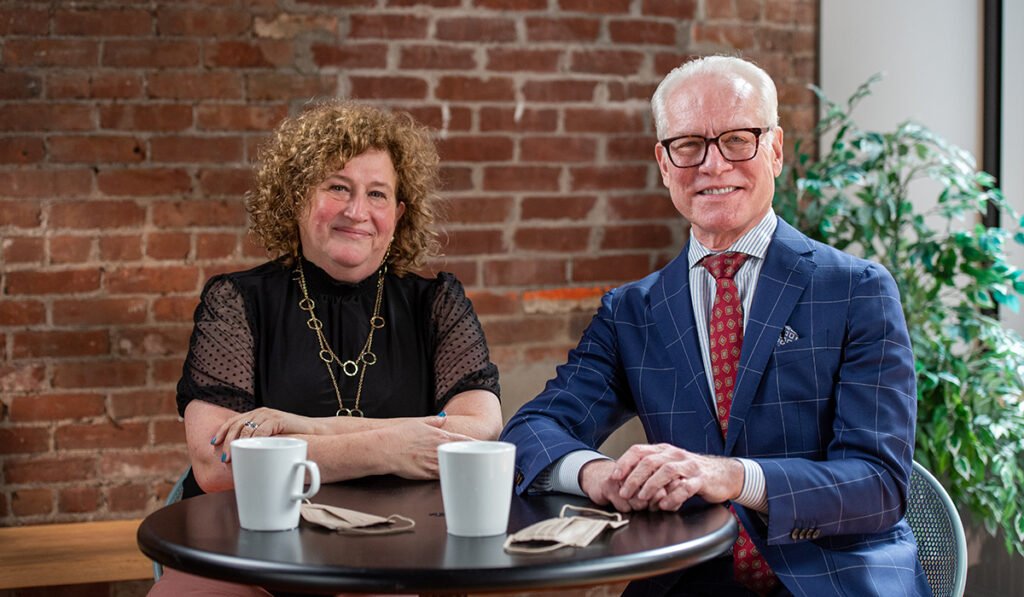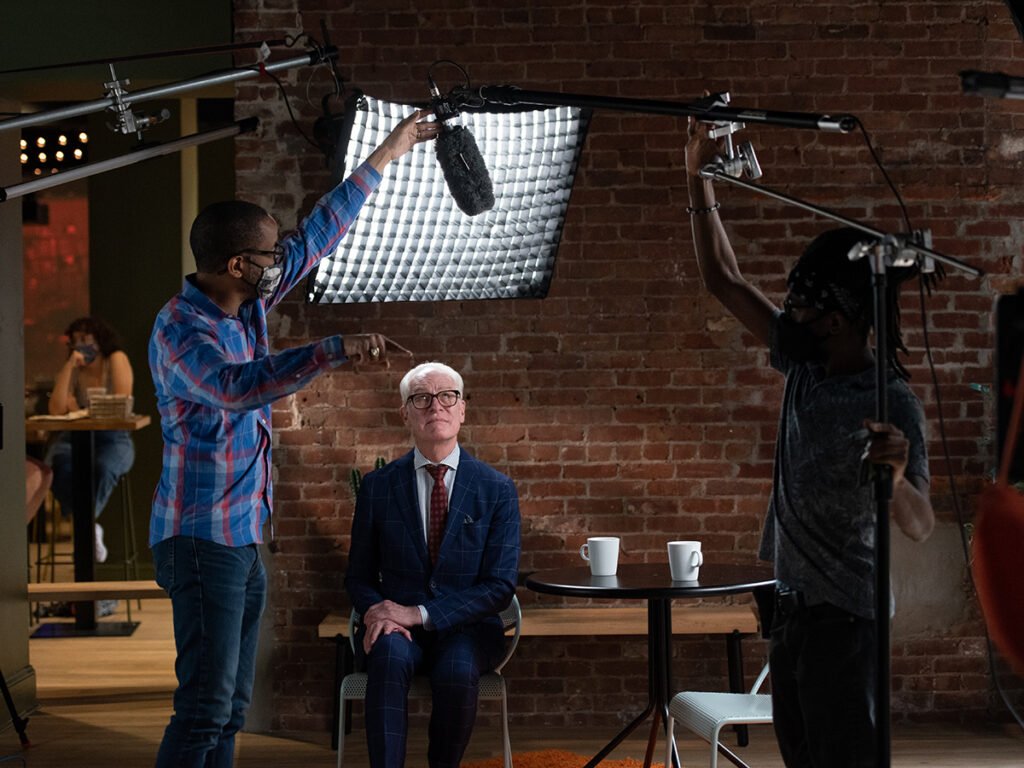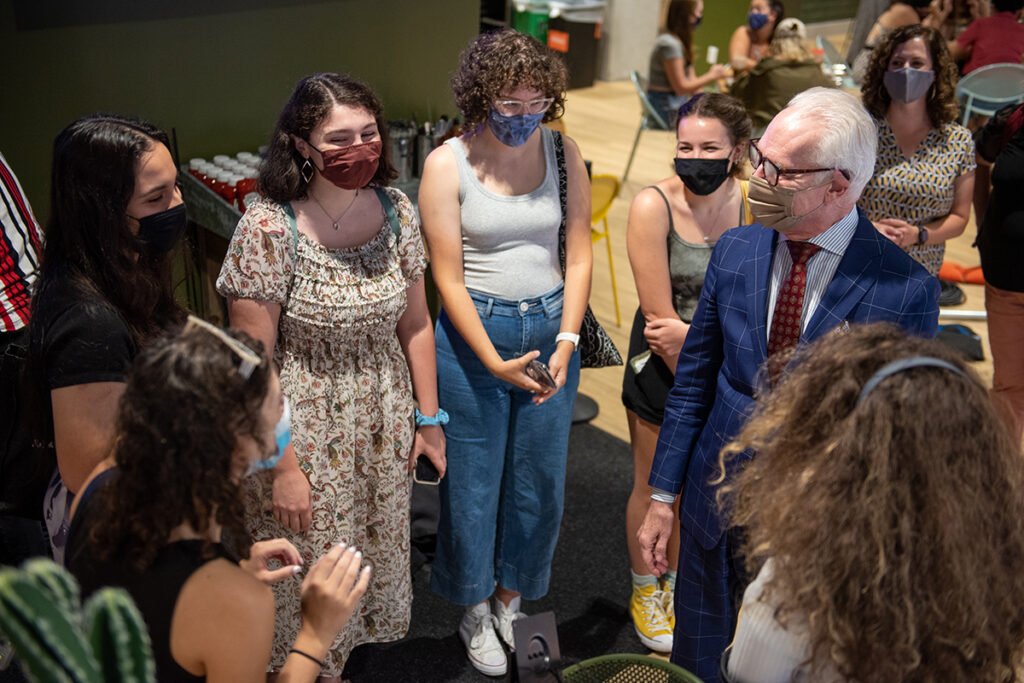Students to Make an Impact with TV’s Tim Gunn in New Winter Course

This January, Emerson students will have the opportunity to help solve a human problem with one of television’s most beloved on-air mentors: Tim Gunn, of Project Runway and Making the Cut.
Innovation for Impact, a unique 4-credit winter session course team taught by Gunn and Sharon Topper, Marketing Communication affiliated faculty member, is a master class in taking an idea and making it a reality. Undergraduate students from any major, working as individuals or in small groups, are invited to submit a pitch for a project they hope to develop during the class. Pitches are due by October 20, with accepted projects announced on November 10. The course will run December 20-January 7.
Apply to Innovation for Impact
Emerson Today talked to Gunn and Topper about the course and what makes it unique. This interview has been edited for length.
Meet the Faculty:
Tim Gunn: A lot of people don’t know that I spent most of my career as an educator, as a teacher — also as an administrator. I was chair of the Department of Fashion Design at Parsons [School of Design], the last seven and a half of the 24 years that I was there, and the Project Runway producers discovered me …at Parsons and asked me to be a consultant for this new show they had, a reality competition show with fashion designers called Project Runway.
That was 17 years ago…I’m happy to say [former model and TV host] Heidi Klum and I have landed on Amazon Prime Video with a new show called Making the Cut, which we love, and we’re waiting to hear whether we get picked up again. I will also boast that I’m a New York Times-bestselling author — who knew that would happen? I’m a voice on Disney Junior in a show called Sofia the First, I played Baileywick the castle steward, and also another Disney show called Mickey and the Roadster Racers. I play a very cranky journalist who reports on travel.
Sharon Topper: I worked for startups for…over 20 years, based in Israel, doing European marketing, global marketing. [I] started here at Emerson 2019, and am just completely blown away by the community, the creativity. I was telling Tim, [I have] the best of both worlds, teaching the Business minor to creative major[s] is amazing, because they have all the kind of ideas and inspiration and … they pick the Business minor so they can actually understand how to make it work.
How it Came to Be:
TG: It’s one thing to have the idea, it’s another thing to bring it to fruition. I just want to add, it’s because of Sharon that I’m here. I was invited as a speaker in a series that Sharon had. We had a wonderful conversation for the series, Sharon and I, and I, quite frankly fell in love with her, and we didn’t know we’d have such fabulous chemistry together. And then I was a guest critic of sorts, in Sharon’s other Spring semester class, and fell in love with the Emerson community — with the level of intelligence and creative thinking and risk-taking. It’s a fantastic place. I’m really wowed.
ST: The class was MB400, by the way, which is the capstone of the Business minor…One of the modules of the class is having each student pitch an idea to the rest of the class. And then they pick the ones that they want to work on most. So they pick three or four, and then they create the teams around them, and then build them, go through the market need, who’s the customer until the final presentation, which Tim also was part of critiquing. It was amazing.
TG: I was so impressed and so captivated by my one experience with Sharon’s students. I actually asked, ‘Can I do the [class] finale?’ and was thrilled to be part of it. What also impressed me was the synergy that the students have among themselves and the way in which they work together so supportively. At the same time, they’re willing to challenge each other…They’re an impressive community.
ST: The ideas were very personal. One student’s family bought an inn before the pandemic, and it’s small and they don’t have the staff of a huge hotel, so her idea was to come up with a communication platform that she can work with the guests with, which was no-touch, which was giving them personal attention. [It was b]rilliant, you know, as an app that she could then go and offer to other small inns as well.
TG: Which they needed.
ST: They desperately needed. You know, obviously, a hotel like the Four Seasons has unlimited resources.

TG: However, as I said to that group of students, if you’re at the Four Seasons, housekeeping comes when housekeeping comes. With this app, you can schedule it. I mean, I thought the Four Seasons needed it too.
ST: Absolutely, yeah. So we see that innovation comes from people who are not afraid to take chances, to think creatively, [exhibit] original thinking around a problem, a real problem that’s facing that they’re familiar with. So that was the whole impetus for this winter class.
What are you most excited about sharing with students in this new course?
TG: I’m just excited about what they’re going to bring, because it’s a big unknown. We don’t have any foregone conclusions or desires, other than helping make the world a better place. And I look forward to that. I love getting excited about something new.
ST: Yeah, it’s unscripted, that’s the part that I love. It’s experiential. It’s not about teaching the same class, again and again, it’s really driven by where the students take it.
We’re going to be bringing in speakers from all different industries and backgrounds to kind of share their stories and share their expertise. I’ve worked mostly for startups, and I teach that in my classes too, some things you only learn by doing. But it’s also what you do [and] things come across that never happened before. You just deal with it as it comes.
Tim has said a lot of wise things. I mean, seriously, since I’ve known him, he says these things that just stick in my brain, and one of the biggest ones is talking about life[‘s] serendipitous path, and not knowing what any experience is going to bring you for the future. We have students who are going out and finding their path.
I think that is another thing that we want to sort of talk about is, whatever you do, you could come up with your own idea. You can work for a company, you might work for a company that you thought would be your dream job, and then you hate it because it’s just not what you want. This class is meant to empower our students to know that they can do anything. We’re encouraging people to do what they feel comfortable with, but the richer the experience, the better the product will be.
Who should apply for Innovation for Impact?
TG: Well, someone who was has a passion about a human issue, a social responsibility issue that … requires having creativity and profound ideas. Sharon and I keep saying [it’s] about passion. You don’t believe in this 1,000 percent? Don’t do it. We’re looking for that kind of contagious set of seeds that will really flower and flourish.
ST: Also, I have to say, people who are fearless, people who are not afraid to fail, because there’s always failure involved, that’s where you learn. And [people who are] not afraid to understand that something might not be working, and pivot, understand that they can do it in a different way.
TG: [To] learn from the fact that it didn’t work. We’re all in this together. We’re all partners on this.

ST: It’s open, literally, to anyone who has an idea.
Describe Your Teaching Style
TG: I describe it as Socratic. I pummel my students with questions.
ST: I like to think of myself as a mentor that teaches from my experience, but also listens. I usually start off my classes asking about people’s experience, …in school and work and at home, because all of this is part of their background and their experience. I like to think of myself as a good listener.
What are some teaching methods you’ve learned over the years that you can apply to this course?
TG: You need to let things happen. You need the students to do 60-70 percent of the work. As Sharon said, you need to be a good listener, and that’s why I pummel people with questions, because I need to know where they’re coming from and what their objectives are, and then help them measure how well they’re achieving that. And just being open to all possibilities.
ST: I would say for me, to not assume that I have the answer, the definitive answer, because I tap things only from what I know and my experience, but it doesn’t mean that someone else’s experience doesn’t work for somebody else. I don’t claim to have all the answers. In fact, when you’re talking about certain things — specifically, social media — I expect my students to know much more than I do. I’m sort of on the other side of the digital divide, having grown up in tech startups, right? But something like social, they get it. It’s a two-way learning experience.
What are some innovations that have blown you away?
ST: I mean, something as simple, I guess, or as ubiquitous now as an iPhone. I can’t imagine living without it. It has completely changed the photography market, printing, communication. This little device does so much. In my former life, working for startups, you go to the tech shows and you see these amazing things all the time that people come up with, but a lot of them are derivative. But the cell phone, it’s really hard to imagine what life was like before it.
TG: I’ll say, speaking for the world or worlds of retail, not just fashion, online shopping. Quite remarkable what that has become.
ST: Before there was a cell phone, before there was online shopping, there was no cell phone or online shopping, right? Someone came up with that idea, thought about the need of having your entire music library in a device, and then adding the phone to it, like an iPod, and then iterating. That’s the wonderful thing about innovation.
TG: It becomes fully integrated into your life and inextricable from your life.
What makes Emerson a good fit for this and you?
TG: I think it’s fairly accurate to say that the seeds of this course were sown based on the experiences that Sharon has had, and that she’s now shared with me about what the Emerson student population is capable of. It’s grown out of this culture.
ST: We really are known as a creative community, but the greatest ideas come from the creatives. I mean, you could be an engineer and be creative. Or you could be an artist or theatre major and come up with an innovation that’s going to change the entire industry. It’s just taking them through the process, from beginning to end, to get the confidence that they can do that, no matter what they’re doing.
They can innovate, also, at the existing company they’re at, they don’t have to start their own startup, they can just think innovatively.
Learning from other cultures is so important.
TG: Which is why we’re looking for a very diverse student population in this course.
Categories